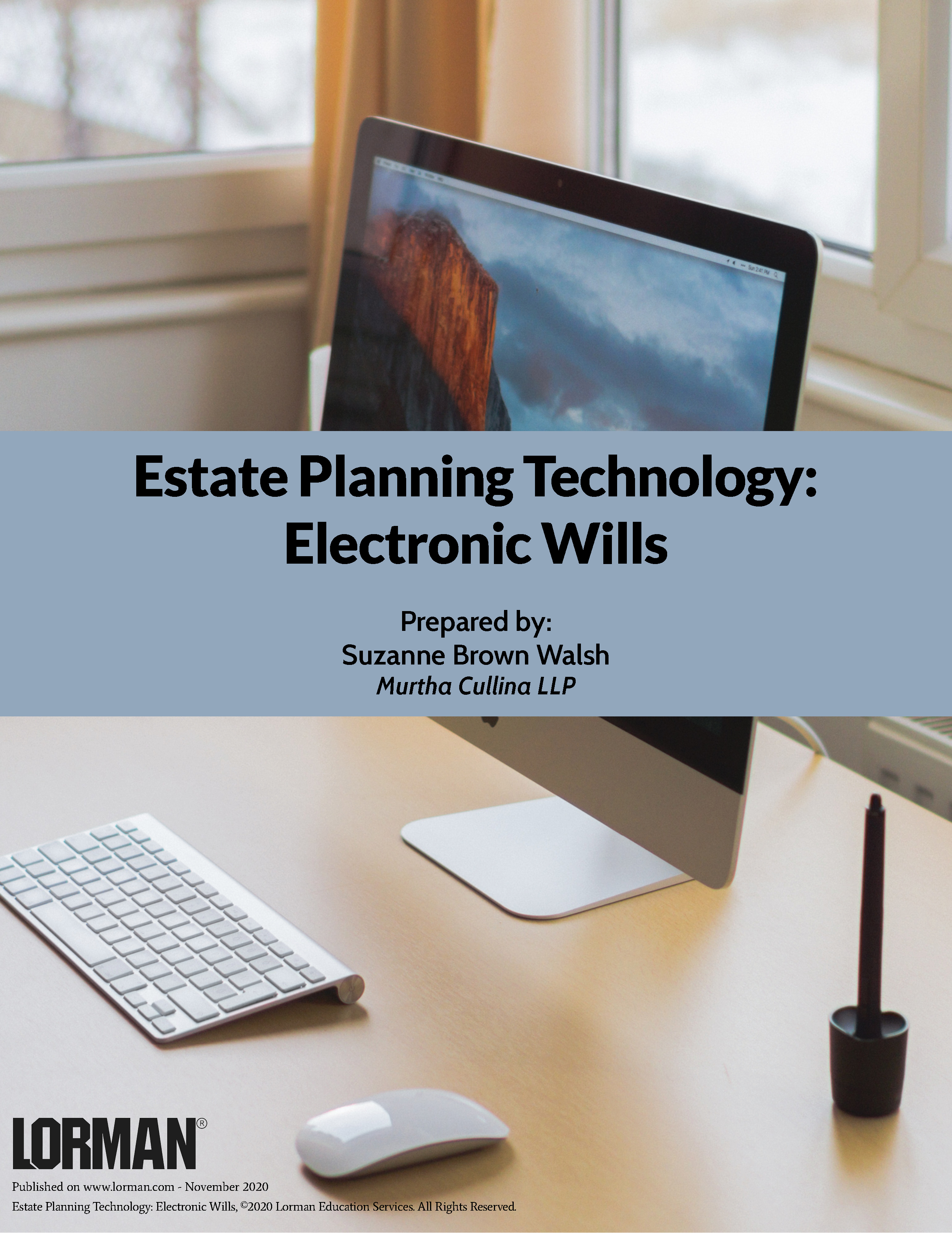Learn if existing wills laws accommodate e-wills.
All state Wills Acts prescribe formal requirements for making a valid will. Wills Acts also contain various requirements as to whether a signature can be acknowledged later, after the signing, what constitutes signing in the testator’s presence and so forth. Finally, a modern addition to most Wills Acts is the option of including a notarized, self-proving affidavit, which eliminates the requirement that the witnesses appear in court to swear that they saw the testator sign the will. The statutes that allow for witnesses to sign wills, or sign self-proving affidavits, after the testator have become much more important during the COVID-19 pandemic. This white paper reviews the ongoing battle between will formalities and effectuating intent and discusses the E-Wills Act and remote executions.
Agenda
Faculty

Suzanne Brown Walsh
Murtha Cullina LLP
- Member in Murtha Cullina LLP’s trusts and estates department
- Represents clients in the areas of estate and tax planning, particularly for families of children with special needs, elder law, estate and trust administration, trust modifications and trustee changes
- Nationally known for her speaking and writing, including the Heckerling Institute on Estate Planning, the Southern Federal Tax Institute, and numerous regional organizations throughout the country
- Since 2005, she has served as one of Connecticut’s Commissioners on Uniform Laws; as such, she represents the state as a member of the Uniform Law Commission, a national organization which promotes statutory uniformity
- Presently a member of the ULC’s Joint Editorial Board for Uniform Trust and Estate Acts, its Legislative Council, and the Drafting Committee on Fundraising through Public Appeals Act; previously, she chaired the ULC’s drafting committees for the Uniform Electronic Wills Act (2019), Revised Uniform Fiduciary Access to Digital Assets Act (2015), the Amendments to the Uniform Principal and Income Act (2008), as well as a study committee on mental health advance directives
- Fellow of the American College of Trusts and Estates Counsel (ACTEC), immediate past chair of its Digital Property Committee, and is a member of the Digital Property, Program and State Laws Committees
- Has served on the board of directors of several community organizations, including PLAN of Connecticut, Inc., a nonprofit corporation providing low-cost trust services to the families of the disabled; before it was disbanded, she served for years on the Connecticut Law Revision Commission’s Probate Advisory Committee
- Has achieved the highest rating in the Martindale-Hubbell Law Directory; ranked in Chambers High Net Worth, Chambers & Partners-Publishing
- J.D. degree, Suffolk University Law School; B.S. degree, Boston University
All of your training, right here at Lorman.
Pay once and get a full year of unlimited training in any format, any time!
- Live Webinars
- OnDemand Webinars
- MP3 Downloads
- Course Manuals
- Audio Recordings*
- Executive Reports
- White Papers and Articles
- Sponsored Live Webinars
Additional benefits include:
- State Specific Credit Tracker
- Members Only Newsletter
- All-Access Pass Course Concierge
* For audio recordings you only pay shipping
Questions? Call 877-296-2169 to speak with a real person.
Thank You!
Download White PaperMore Program Information

Access to all training products $699/year
Unlimited Lorman Training
With the All-Access Pass there is no guessing what you will need for your yearly training budget. $699 will cover all of your training needs for an entire year!
Easy Registrations
Once you purchase your All-Access Pass you will never be any further than one-click away from attending any Lorman training course.
Invest in Yourself
You haven't gotten to where you are professionally by luck alone; it's taken a lot of hard work and training. Invest in yourself with the All-Access Pass.